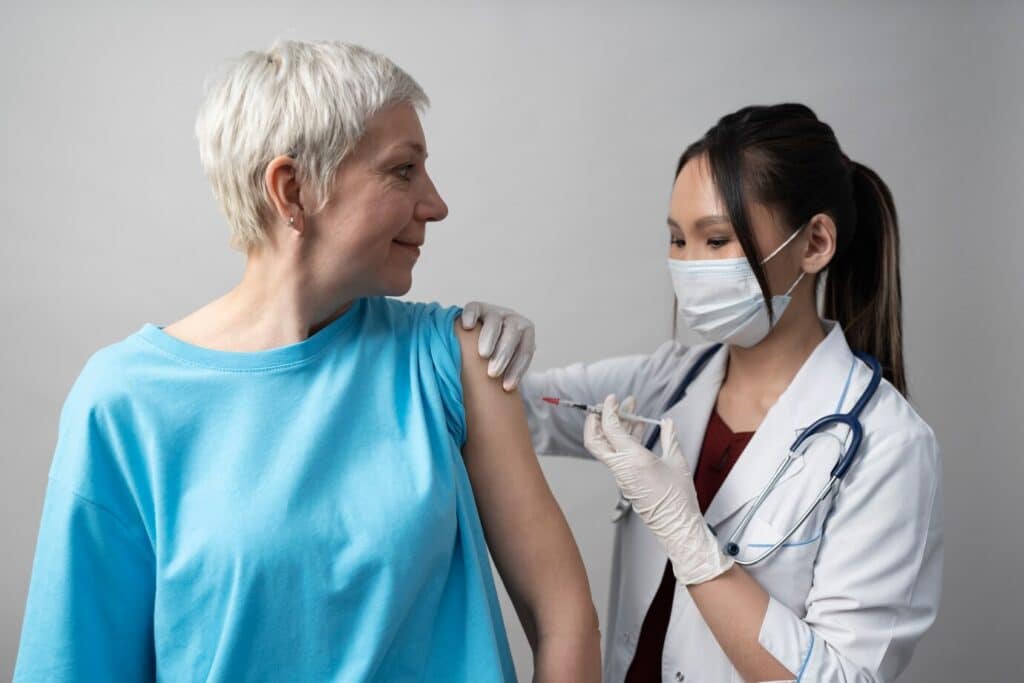Our immune system weakens as we age, making us more susceptible to infections like pneumonia. However, there’s a powerful shield available to protect seniors from this potentially life-threatening illness: vaccination. This comprehensive guide delves into everything seniors need to know about pneumonia vaccination. From understanding the importance of immunization to knowing when and where to get it, we’re here to ensure you have all the information you need to make informed decisions about your health and well-being.
Why Pneumonia Vaccination Matters:
Pneumonia is a severe respiratory infection that can lead to hospitalization and even death, especially in older adults. Vaccination is the most effective way to prevent pneumonia and its complications. Seniors can significantly reduce their risk of developing pneumonia and experiencing associated severe symptoms by getting vaccinated.
Understanding Pneumonia Vaccines:
Two main types of pneumonia vaccines are recommended for seniors: the pneumococcal conjugate vaccine (PCV13) and the pneumococcal polysaccharide vaccine (PPSV23). PCV13 is typically recommended first, followed by PPSV23 at a later time. These vaccines work by stimulating the immune system to produce antibodies that can recognize and fight off pneumococcal bacteria, the most common cause of pneumonia.
When to Get Vaccinated:
Seniors should get vaccinated against pneumonia as soon as possible, especially if they have certain risk factors such as age over 65, chronic medical conditions like diabetes or heart disease, or a weakened immune system. Additionally, individuals who smoke or have asthma should also consider vaccinations to protect themselves against pneumonia.
The Importance of Booster Shots:
While vaccination provides crucial protection against pneumonia, immunity can wane over time. That’s why seniors need booster shots, as their healthcare provider recommends. Booster shots help to maintain optimal immunity levels and ensure ongoing protection against pneumonia and its complications.

Booster Shots
Dispelling Common Myths:
Despite the overwhelming evidence supporting the efficacy and safety of pneumonia vaccination, some misconceptions persist among seniors. One common myth is that vaccines can cause the flu or other illnesses. However, pneumonia vaccines do not contain live bacteria and cannot cause pneumonia. They are safe and well-tolerated, with the benefits far outweighing the potential risks.
The Role of Healthcare Providers:
Seniors should consult their healthcare provider to determine the most appropriate vaccination schedule based on age, medical history, and individual risk factors. Healthcare providers can also address any concerns or questions seniors may have about the pneumonia vaccination, helping to ensure they feel confident and empowered to make informed decisions about their health.
Accessing Vaccination Services:
Vaccination services are widely available at healthcare facilities, pharmacies, and community health centers. Seniors can schedule appointments with their healthcare provider or visit a pharmacy offering vaccination services. Additionally, many pharmacies provide walk-in vaccination clinics, making it convenient for seniors to access the protection they need against pneumonia.
Promoting Vaccine Awareness:
Increasing awareness about the importance of pneumonia vaccination is essential to ensuring more seniors are protected against this potentially devastating illness. Healthcare providers, community organizations, and local health departments can play crucial roles in promoting vaccine awareness through educational campaigns, outreach programs, and community events.
Overcoming Barriers to Vaccination:
Despite the availability of pneumonia vaccination services, some seniors may face barriers that prevent them from getting vaccinated. These barriers can include limited access to healthcare services, transportation challenges, and cost concerns. Healthcare providers and community organizations must address these barriers and implement strategies to make vaccination accessible and affordable for seniors.
Monitoring Vaccine Coverage:
Monitoring vaccine coverage rates among seniors is vital to evaluating the effectiveness of vaccination efforts and identifying areas for improvement. Healthcare providers and public health officials can track vaccination rates through immunization registries and surveillance systems, allowing them to assess progress toward achieving optimal vaccine coverage and reducing the burden of it among seniors.
Empowering Seniors to Take Control of Their Health:
Ultimately, the decision to vaccinate against pneumonia lies with each senior. By providing accurate information, addressing concerns, and promoting vaccine awareness, we can empower seniors to take control of their health and make informed decisions to protect themselves against it and other vaccine-preventable diseases.
Join our community
Pneumonia vaccination is a vital tool for protecting seniors’ health and well-being. By understanding the importance of vaccination, knowing when to get vaccinated, and overcoming common myths and barriers, seniors can take proactive steps to safeguard themselves against this severe respiratory infection. Remember to consult your healthcare provider to determine the most appropriate vaccination schedule. Together, let’s prioritize vaccination and ensure every senior has access to the protection they need against it.
Contact us
Are you or a loved one in need of pneumonia vaccination services? Don’t hesitate to reach out to us at Westmont of Morgan Hill. Our dedicated team is here to help you navigate the vaccination process and ensure you receive the care and protection you deserve. Contact us today at 408-779-8490 to learn more and schedule your vaccination appointment. Your health is our priority.


